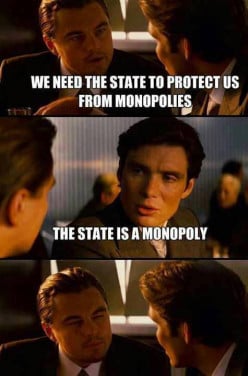Why do so many LIBERALS simply do not get it regarding the free market
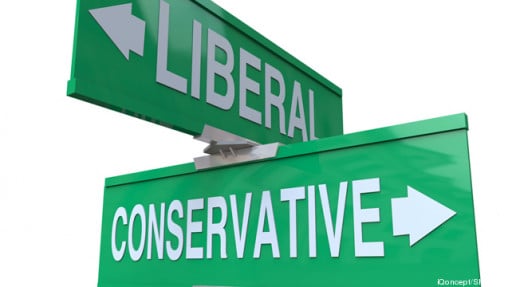
enterprise- capitalist system while many CONSERVATIVES do?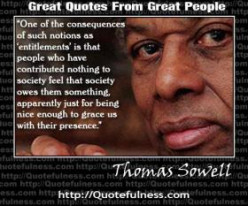
Hi there, Ms. Williams. It is possible that your one sided OP statement proves that it is conservatives that do not fully “get it.”
It has often been said that both liberals and conservatives promote the free market enterprise-capitalist system. However, liberals are better at remembering our history, a history too many conservatives would like to forget.
Liberals have learned through the years that industries need regulation and oversight. While Conservatives cling to textbook theories and hypothetical examples to extol the virtues of little or no regulation of commercial activities, progressives recall real life incidents like the Triangle Shirtwaist Factory fire of 1911.
Due to the lack of adequate regulations, exit doors were locked and some stairwells were used for storage. It is now obvious that these conditions were in place for a long period of time specifically BECAUSE this negligence served only the interests of enterprises like Triangle Shirtwaist. Within 30 minutes, 145 people perished in the blaze or jumped to their deaths from nine floors above the street. {1}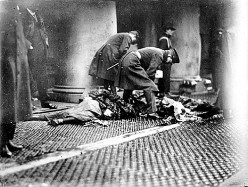
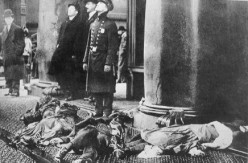
America has learn that an unregulated “free market” does not punish corporate collusion and price fixing, two practices remarkably successful for increasing profits at the expense of customers. America has not forgotten that an unregulated “free market” did not penalize the Tobacco Institute, an industry wide lobby formed to push back against regulations to protect consumers. America knows that an unregulated “free market” does not discourage business acquisitions in which corporate giants devoured smaller companies for the purpose of eliminating, not stimulating, competition. In short, America knows corporations in an unregulated free-market environment can not be relied on to operate in the best interest of society and the consumer.
Is it true that only one viewpoint really “gets it” while the other does not? Or rather, have we learned that only the moderates from all viewpoints are best suited to man the helm of state?
{1} http://law2.umkc.edu/faculty/projects/f … count.htmlAnyone who tells you that a free market would lead to collusion and price fixing is obviously not an economist, and has never studied Game Theory. Take their "expertise" with a grain of salt. The only way collusion and price fixing could possibly work is in a regulated market with built in loopholes that would allow it to happen, not in a free market.
The Tobacco Institute had absolutely nothing to do with a free market or economic policy. As it turns out, the market did punish the Tobacco Industry, tobacco consumption has been in a steady and rapid decline since the late 60s.
Anyone who tells you that corporations "devouring" small companies hurts competition is, again, obviously not an economist. Large firms buying up smaller companies only servers to create more competition, since there is an inevitable explosion of smaller companies looking to get bought up. Buying out a smaller company eliminates a competitor, not competition.
I don't know who's telling you this stuff, but if they ever offer you a glass of Kool-Aid, whatever you do, don't drink it. In a free market society, taking care of your customers is the only way to survive. In a free market, competition between companies polices itself, nearly always to the benefit of the consumer.
"The market will reward the wise, slap the greedy, and destroy the foolish"Well, there goes my perception of history. First thing I thought of was Rockefeller and Standard Oil, then crawled up the timeline to the old "Ma Bell" monopoly - but I guess I just don't understand because I'm not an economist, nor have I studied the Game Theory.
Tell me, was there ever a true Free Market period that matches your theories? In the real world I mean.
GALol, yeah, being from Florida I know all about Standard Oil. Nearly everything down here is either named "Flagler", "Osceola", or something "Beach" (ironically, we also have a lot of "Winters" down here: Winter Park, Winter Garden, Winter Springs, etc.)
Both of those, companies were only able to grow to the level that they did by exploiting the existing regulations at the time. Had there been free market competition, they never would have been able to "game the system" so to speak.
As for a "true Free Market period", there were times when the market was certainly more free than it is now: early English settlements, during the period after the Revolution, and again in the South after the Civil War, but there has never been a "true free market" in the U.S.
As for the world, you generally only find free markets in third world or undeveloped countries. Most opponents of a free market will use India as their poster child, which is fair to a certain extent, but it has larger problems that contribute to the conditions there, problems outside the scope of what the market is able to correct.
Good evening, Mr. McIntyre. I do not think I have had the pleasure to exchange ideas with you before now. It is nice to meet you.
Your comments have many facets and, with your permission, I will respond to each with a separate post.
Once again, I read the “Kool-Aid” reference that has grown so popular. When used to put down someone or their opinions, I see nothing but a crude and disrespectful reference to over 900 suicide victims and a US Congressman who died at Jonestown. {1} It is certainly not a term I expect from sensitive and well-educated authorities. When applied to me, I am offended by the implication that my opinions are delusional and I am amused by the implication that the accuser’s opinions are infallible. The phrase is already trite and I hope short-lived.
As for my sources, you need only to follow the links I provide or ask me (more pleasantly I would hope).
I sincerely hope you have a pleasant night.
{1} http://www.cnn.com/2008/US/11/12/jonestown.factsheet/The pleasure is all mine. It's always nice to interact with well established members of any community, and I would say that, given your 4+ years at HubPages, you certainly qualify.
And out of respect for your views, I shall respond in kind.
First of all, let me compliment you: that was an amazing Ad Hominem. One that I nostalgically read several times in the voice of one of my old ECON professors. He was a strong Keynesian, and as such, was less than amused with my Austrian School views.
As for the term itself, while I can certainly understand your distaste for what is seemingly a callous reference to an unspeakable tragedy, I can assure you that no such reference was intended. As the media is prone to do from time to time, they have co-opted this phrase (which admittedly does make for a more intriguing headline) from it's original intent and usage, which was the experimentation with psychedelic drugs in the late '60s.
Unfortunately, no such references are required. To this day Jonestown remains etched in society as one of the most tragic, and pointless, losses of human life.
I see that I have a few more "replies to reply to", so let me say again that it's nice to meet you, and I will get to work answering your messages.
Hi Mr. McIntyre. If I may continue…
I disagree and provide evidence. The sole purpose of the Tobacco Industry was to deflect free market forces and to influence government policy and you claim it “had absolutely nothing to do with a free market or economic policy.” The Tobacco Institute was collusion across an entire industary. Its role was to deny scientific facts and to push back against market forces by lying to consumers and regulators. This ‘80’s video trumpets the many pro-tobacco activities undertaken by the group, including: lobbying politicians to prevent the passage of smoking laws, fact-checking and disputing anti-smoking statements by the Surgeon General. {1}
{1} http://laughingsquid.com/80s-promo-vide … ade-group/Hello Again, Mr. Quilligrapher,
While I can certainly understand your confusion, allow me the opportunity to shed some light on the issue.
Nearly any organization, when drawn out to its most distant logical evolution, can be deemed as attempting to effect economic change. The Tobacco Institute was an example of a broad conspiracy (not collusion) across an industry to attempt to do the following: Suppress scientific information, Deceive its customers (and the Government) as to the dangers of smoking, Lobby for regulations and policies it felt were beneficial to the Tobacco Industry, and to engage in political attacks against opponents.
Now while there were economic repercussions, to be sure, the Tobacco Institute was not attempting to influence any larger economic policy. It was simply (albeit illegally, unethically, and immorally) attempting to advocate for those it represented.Hi Mr. McIntyre.
Your inability to see my viewpoint hardly means I am the one who is confused.
In fact, you shed very little light and even seem to be confused when you say, “the Tobacco Institute was not attempting to influence any larger economic policy. It was simply (albeit illegally, unethically, and immorally) attempting to advocate for those it represented.” Intentionally or not, you shifted your focus away from the statements in my post.
I did not claim the Tobacco Institute was “attempting to influence any larger economic policy,” so why bring it up? I said, the “purpose of the Tobacco Institute was to deflect free market forces and to influence government policy.” It is one of many real life examples that demonstrates why enterprises can not be relied on to act in the best interests of its own customers much less for the benefit of our society on a whole.
I am thinking, Mr. McIntyre, we might all benefit if you fed us fewer textbook theories and more real life examples. It appears not all of the theories hold up in the real world.
In time, you may learn that I take everyone’s “expertise” with a grain of salt. I cited real world examples. You criticize me for saying “an unregulated ‘free market’ does not punish corporate collusion and price fixing” but you did not provide any examples to prove that it has.
Economic and Game Theories are not convincing when compared to real world examples of free market shortcomings. In fact, it confirms what I said. Some folks “cling to textbook theories and hypothetical examples to extol the virtues of little or no regulation of commercial activities, progressives recall real life incidents like the Triangle Shirtwaist Factory fire of 1911.” The legacy of the Triangle fire was regulations and oversight not to impair our free market system but to curtail extreme abuses inherent in the system itself.
Here is another real life example of collusion and price fixing from among many…
The New Zealand Herald (June 13, 2013) –“Air New Zealand will pay more than $8 million in penalties for its role in air cargo price fixing, offending which a High Court judge says hurt consumers and was at the "serious end of the spectrum... In his ruling yesterday Justice Geoffrey Venning said Air New Zealand's conduct in the case was "at the serious end of the spectrum" and was anti-competitive.” {1}
I would welcome a few links to some real life, not theoretical, examples of how market forces alone prevented collusion and price fixing.
{1} http://www.nzherald.co.nz/business/news … d=10890380Always a wise policy, and, having had the opportunity now to read your last couple responses, one that I find unsurprising from such an obviously learned individual.
A free market, were it to exist, would render collusion obsolete. It would be disastrous for any group of corporations to pursue because it creates such an obvious, and potentially fatal, vulnerability. It would leave these companies completely helpless when (and I use the term "when", because the eventuality of this happening would be an economic certainty) a new competitor entered the market.
There would be no motivation for a new competitor to participate, since they would have unprecedented control over such a large market share. The opportunity cost of not doing so would simply be too high to ignore.
Corporate Collusion is one of the things that sounds great to a politician; it seems like a perfect example for the need for more oversight by the government. It is in fact, however, a "solution without a problem", as the most fundamental principals of business would, in a free market, make it a non-starter.
The Triangle Shirtwaist Factory had nothing to do with free market or economic policies, and the assertion that it did is simply not factual. It was a product of poor workplace safety and the political and social policies concerning immigrant workers at the time.
Much like with the Tobacco Institute, you're using the broadest possible implications of the cause of the incident to try and find some deeper, underlying economic culprit.
That would be like asking for examples of times when a speed limit sign prevented someone from speeding. All we can do is look at what we know about the free market, and what the data tells us, and draw our own conclusions.
I would only note that, even in the case you cited, had this happened in a truly free market, a competitor would have inevitably stepped in and undercut the competition. This is always the case in a free market.Hey there, Mr. McIntyre.
It is your unsupported opinion “the Triangle Shirtwaist Factory [fire] had nothing to do with free market or economic policies.” Then in the next sentence, “It was a product of poor workplace safety.”
Therefore, you would have us believe that poor workplace safety is some how separate and removed from the workings of a free market system. To the contrary, George Reisman, an American economist, Professor Emeritus of Economics at Pepperdine University and a staunch defender of laissez-faire capitalism tells us safety improvements are a by-product of a free market.
“Very importantly, a free market also serves to bring about improvements in safety even in cases in which they do not pay for themselves through improvements in efficiency, that is, even in cases in which they result in the incurrence of additional costs.” {1}
It seems obvious that the Triangle Shirtwaist fire is evidence of a serious free market failure. Not just a tragic failure of just one enterprise, mind you, for the perilous working conditions at Triangle and unsafe manufacturing environments in general were common place at the time. According to theory, if Triangle employees could have moved to equivalent, safer workplaces then Triangle would have lost its work force and gone out of business.
In the end, Mr. McIntyre, the opinion that the Triangle Shirtwaist Factory [fire] “was a product of poor workplace safety” having “nothing to do with [the] free market” is contradicted by Prof. Reisman. The causes of this incident do indeed reveal a deeper underlying economic culprit. Perhaps it is the influence of human nature, or greed, or ignorance. What ever the culprit, it is another real life example that demonstrates why an enterprise can not be relied on to act in the best interests of its own employees much less for the benefit of our society as a whole.
{1} http://mises.org/freemarket_detail.aspx?control=436
Mr. McIntyre,
You would have us believe “Buying out a smaller company eliminates a competitor, not competition.” However, in the real world, when the giant firms finally get around to the last competitor, buying out that smaller company eliminates both a competitor and competition in blunt and realistic contrast to your claim.
In addition, in his paper “ELIMINATING POTENTIAL COMPETITION: Mergers Involving Constraining and Prospective Competitors”, John Kwoka of Northeastern University discusses two versions of the Economics of Potential Competition. He specifically notes, ”The second version of this doctrine entails a firm that objectively is likely to enter the market, even if not so perceived. Its elimination by merger prevents future entry that would have led to deconcentration of the market and the strengthening of competition.” {1}
Therefore, I submit scholars recognize that mergers and acquisitions can be used as a strategy for eliminating competition even if you do not.
{1} http://www.economics.neu.edu/papers/doc … 05-007.pdf page 2Greetings again Mr. Quilligrapher,
Again, you're confusing the issues here. Buying out your competitors does not eliminate competition. In a truly free market, there is no way for any company to completely eliminate competition..
I own a Consulting Firm, if I were to buy up every other Consulting Firm in my area, all I would have done is remove those particular competitors from the market. I would not have "eliminated competition" however, since there would be absolutely no way to prevent a new Consulting Firm from starting up, or moving into my area.
What those who vilify corporations for buying up smaller competitors, have a tendency to ignore the fact that, the most common reason for buying a smaller competitor is for acquisition, not elimination.
It's ironic that you would use Prof. Kwoka (whom incidentally, I've had the privilege of hearing speak on more than one occasion), for your example. One thing that he, and you, fail to recognize is that the ability to truly "eliminate competition" can only exist in a regulated environment, where existing laws and regulations can be exploited to prevent any additional entrance into the market.
The most famous example of this phenomenon is that of the Wright Brothers{1}, who were able to exploit broad interpretations of patent law to stifle competition and essentially bring the burgeoning aircraft industry to a screeching halt.
Believe me, I understand all of the confusion regarding the properties of a free market since it's been so long since we actually had one in this country; this is largely the result of the Western World's love of Lord Keynes.
As Adam Smith taught us in The Wealth of Nations:
"By pursuing his own interest he frequently promotes that of the society more effectually than when he really intends to promote it. I have never known much good done by those who affected to trade for the public good. It is an affectation, indeed, not very common among merchants, and very few words need be employed in dissuading them from it."{2}
Although speaking on his preference for domestic, rather than foreign trade, the core principal is the same.
Hoping that these replies have found you on a happy (and productive) Monday,
Shawn McIntyre
{1} http://en.wikipedia.org/wiki/The_Wright … patent_war
{2} http://www.econlib.org/library/Smith/smWN13.htmlShawn, I have been following with great interest the conversation between you and Quill. You extol the virtue of the free-market above all. You seem to indicate that in a pure free market environment the proper balance would be realized between the needs of the capitalist, consumer and the general public, without government involvement. How is that possible? Here are a couple of questions for you
1. In my research I find that up toward 90% of the world nations (governments) have minimum wage laws that are to be complied with by employers. Do you think that all these governments have identified a problem with the unfettered free-market and might be aware of something that the free marketeers are not?
2. Many years ago I took a tour of Kellogs, in Battle Creek, Michigan. I was pulled aside and told that USDA is involved in inspecting lots of cereal for extraneous matter which is permitted only up to certain levels, rat hair, droppings, etc. I was told that the company was only interested in eliminating extraneous material that is obvious to the consumer only upon his inspection and use. But we all know that what you don't see can hurt you. It cost money for Kellogs, and its competitors, General Mills and Post to insure the cleanliness of their products to levels beyond what is visible to the human eye. What about books like 'the Jungle'? Does government have a role to be proactive to prevent sickness among its citizens or do we let the free-market choice of the consumer come to play as a result of enough consumers becoming sick on the use of any one company's product? If I mentioned this to you before, let me know?
3. Having lived in California for many years, there was a health inspection rating system. Once a restaurant is inspected, the rating A-D is given. That rating is required to be placed by the restaurant owner in a prominent place within its establishment. Having a "C" rating placard was the kiss of death for any restaurant business. You would always be checking the 'B" restaurants, wondering why it did not get an 'A' and would the shortcoming affect your confidence in wanting to eat there? From your perspective, would that be government meddling? Again, the free-market is fine in allowing the consumer the ability to go to another establishment when the food in not great and/or the establishment gives the impression of not being clean simply through direct observation. But what about food handling practices and operations outside of the immediate view of the consumer? As a capitalist, would I not be interested in keeping costs to the lower levels consistent with customer satisfaction? What you cannot see cannot hurt you, so why incur the expense? The manager may not be concerned about aspects that the customer cannot identify nor appreciate as discretionary factors in his choice of dining establishments. Unsanitary practices result in food borne illnesses, sometimes quite severe, but not identified by the consumer as such until it is too late.Hi Credence2, always nice to meet fellow "Hubbers". I've glanced ahead and you've asked some really great questions. Hopefully my answers will help clear up some of my positions on economic issues.
In a free market, while there are a myriad of complex variables, the core underlying principal at the very foundation of all of it, is the law of "Supply & Demand". If left alone, and free of outside interference, markets will always reach an equilibrium where production and supply equals demand.
No, I think that these governments have found a "no risk, high return" political issue and are exploiting it. Not many people have lost an election by making the argument that poor, and unskilled workers should make more money.
Minimum wage laws however, do not benefit the poor, or the unskilled. What they do is increase unemployment in those categories by artificially inflating the cost of labor. As a practical example of this, I used to keep a few people on staff (usually high school kids), to take care of the lawn care for my office building. When Florida increased the minimum wage in 09, I had to let them go and hire a lawn service; four jobs lost, because of the minimum wage.
This again is an example of the general confusion surrounding a "Free Market Society". Of course the government should be allowed oversight as to the acceptable level of "rat hair, droppings, etc." allowed in food products (which in my opinion should be 0.0%). This has nothing to do with a free market.
Yes, it costs more to "insure the cleanliness of their products to levels beyond what is visible to the human eye", but this is just the cost of doing business. The cost, when distributed against the volume of productivity, is miniscule and will more than likely be passed along to the consumer in the end, so it makes little difference.
As I've said before, "free market does not mean economic anarchy". It means not interfering with, or attempt to manipulate, the basic principals, and fundamental elements of a free market.
This again goes along with the above answer. There is no inherit conflict with the free market from the state requiring restaurants to maintain a certain level of cleanliness and to disclose that level to the public.
Capitalism is not, as you have implied a couple times, about keeping costs as low as possible. It's about keeping profitability as high as possible, and although it may sound counter intuitive, those two are not one in the same. This is something that, as a Management Consultant, I deal with on a daily basis.
I think its because liberals don't tend to fantasize about a society that is non-existent. We know that the only time this country worked under a free market model we had child labor, slavery, and people working in life threatening conditions. Then came the government to balance unfeathered capitalism with social intervention. We understand that capitalism bought us the greatest financial disaster in our countries history by which government had to bail us out. We understand that claims of business can do it better are rarely backed up with true examples. Consider this, most of the advances made in modern society where initiated through government research or funding, not capitalism. The capitalism that drives this country consist mainly of the moving of money or producing products on the other side of the border.
First of all, I think you mean the crash of 1929. The crash of 1920 was unpleasant to be sure, but it was the natural result in the draw down after WWI, and hardly one of the "greatest financial disasters" in our history,
The crash in '29 was caused by a combination of retaliatory tariffs in response to Smoot-Hawley, which caused a $3.3 Billion loss in exports, and the failure of the Fed to step in and mitigate the contraction of the currency supply. Both of which were government policies.
The downturn in '08 was caused by the repeal of Glass-Steagall (which tore down the barriers between investment and commercial banking), and the burst of the housing bubble (which was caused by the Clinton administration's policies on subprime lending).We must include unfettered speculation in the markets, the buying and selling of stocks on margin on terms not possible today.
Yes, captialism without restraint at any level is always a disaster in the making.Yes, I was making reference to the crash of 1929. Are you suggesting that even in 1929 era $3.3 Billion dollars in loss exports would have a vast affect on the economic well being of a entire nation? Was not the Feds failure to step in a method of allowing the free market to work it out on its own? Wouldn't the repeal of Glass-Steagall count as less government intervention in the market place which created a free market. The Clinton administrations policy on subprime lending? Please share more on that point.
Taken point by point, you're right, none of them were enough on their own to create the resulting disasters, but when you add them all up, they create a "perfect storm" of economic conditions that gave us the Great Depression and Great Recession.
The loss of $3.3 Billion (around $44 Billion in today's dollars) would have been painful, no doubt: there would have been widespread layoffs which would have drastically increased unemployment, but it more than likely would have only been a recession had it been the only factor.
If the Fed had stepped in during the bank runs, they could have "stopped the bleeding" (think of George Bailey in "It's A Wonderful Life").
While it may appear that the repeal of Glass-Steagall resulted in a failure of the free market, I'm afraid it only appears that way since we don't actually have a free market. Unless one is advocating economic anarchy, everyone recognizes that there have to be some basic rules in place, free market or no( much like how even in a free society, we still have laws). One of those most basic laws should be that: You can be an Investment Bank or a Commercial Bank, but never both; it's a built in (and as we've seen), dangerous conflict of interests.
As for the push for subprime lending, that's a little more in depth (I'm planning on answering this one in a new Hub), but here's the Schoolhouse Rock version: Basically, the bank loaned money to people who couldn't afford to pay it back, and then packaged and sold those loans investors. When the people inevitably started defaulting on those loans, you had the "burst" of the housing bubble which was one of the contributing factors (and some would say the catalyst) to the Great Recession.Before writing that Hub you may want to look at the difference between subprime lenders and the reinvestment act that were two totally different things. Subprime lending was actually birthed out of the repeal of Glass-Steagall. It was a market reaction not a legislative one.
Clinton started pushing CRA reform (which was the catalyst that kicked off the subprime lending boom) in '93, GLB didn't repeal Glass-Steagall until '99. By the time that happened, the foundation of the crisis was already laid.
Now if you want to talk about the banking crisis that resulted from the housing bubble burst: the effect the collapsing of MBS and CDOs had on the economy, that's a fair point, both of those were compounded by the Glass-Steagall repeal.
Incidentally, both of those will be covered in my next hub.So your argument is that Clinton's well intended government program that had nothing to do with subprime lending or the housing markets collapse was the problem because it allowed the "free market" to do what it does, and we don't understand?
When Clinton started pushing CRA reform, it mandated that a certain percentage of loans had to go to high risk applicants from inner city areas, applicants who the bank knew would, for a variety or reasons, have a difficult time paying those loans back... this is almost the textbook definition of subprime lending.
I don't see how you can call this a failure of the free market when, had it actually been a free market without Government intervention (interference in my opinion), these people never would have qualified for those loans in the first place.You also can't discount the role of the Federal Reserve through its manipulation of interest rates.
That certainly compounded the problem, but then again, the Fed has a history of making a bad situation worse.
Actually, the bankers found a way of making money out of bad risks, until the bad risks became too big and too obvious and then we had the housing crash.
What you're talking about are CDOs, and they weren't the cause of the crash, they were just a way for the banks to profit from the inevitable by betting against their customers. And thanks to the repeal of Glass-Steagall, not only were these banks able to package these junk deals, but then they were able to gain unprecedented exposure in the market thanks to the new "Super Groups" (Citi, AIG, etc.).
Maybe you should start by not using acronyms that are totally unfamiliar to none Americans.
CDOs = Collateralized Debt Obligation
You'll have to forgive me, I figured anyone who was commenting on what "actually" happened would understand the basic terminology involved.
Well I do understand what actually happened, it's just not basic UK terminology.
I can call it a failure of the free market because CRA loans were made by neighborhood banks, not large free market institution that desired nothing more than to resale their loans on the market. CRA banks were more likely to hold and service their loans, subprime lenders sold them as fast as they could. They falsified documents in order to get as many loans on the books as possible because the more loans underwritten the more they could resale. CRA banks were totally different from subprime lenders. Subprime lenders didn't fall under CRA because they were mostly nothing more than loan underwriters not banking institutions.
When the Federal Government steps in and mandates that banks loan money to people who don't qualify, and who don't have the ability to pay it back, then that's a failure of Government, not the free market.
Had the Government not tried to interfere, then the loans in question would never have existed to be securitized and sold on the market in the first place.
The banks were the subprime lenders.
Again, the CRA forced local banks to become subprime lenders.
I'm not sure where you're getting this, but let me give you the basic rundown of what happened:
Carter signed the CRA in '77 in an attempt to help rebuild and strengthen the Inner Cities. In '93, Clinton pushed for CRA reform to start mandating that a certain percentage of loans go to inner city borrowers. This forced commercial banks to engage in subprime lending in order to maintain compliance the new regulations.
In 1999, Clinton signed the Gramm–Leach–Bliley Act that repealed part of the Glass-Steagall prohibitions on what services banks could offer. Up until that time, you could be an Investment Bank, or a Commercial Bank, but you couldn't be both. By eliminating those barriers, the foundation was laid for the Great Recession.
It was the GLB that allowed companies like Citigroup to happen, those "too big to fail" companies we all heard so much about. Had the prohibitions in Glass-Steagall not been repealed, one company never would have been allowed to offer such a wide range of financial products, period.
Again, none of this was caused by a "free market". The Government attempted to manipulate and steer the economy in the interests of social engineering. Now you can disagree about the motives behind it, or how the severity and duration might have been altered by a more proactive Fed, but you can't blame the free market for what was, on its most basic level, a failure of Government.
Capitalism comes with restraint (anti-monopoly laws, campaign finance restrictions). There is not a name for the system we currently have, other than corrupt, because PACs, bundlers, and lobbyists purchase policy that distorts the free market and tilts business in their favor. It's called corruption, and its been the new game in town since campaign finance dollars and big corporate mass communications have determined election results.
The best analysis of the current system I've heard in a while:
"1. Big business and big government are (for the most part) natural allies.
2. Although conservative politicians pretend to hate big government, and liberal politicians pretend to hate big business, most mainstream policies – both liberal and conservative – involve (slightly different versions of) massive intervention on behalf of the big-business/big-government elite at the expense of ordinary people.
3. Liberal politicians cloak their intervention on behalf of the strong in the rhetoric of intervention on behalf of the weak; conservative politicians cloak their intervention on behalf of the strong in the rhetoric of non-intervention and free markets – but in both cases the rhetoric is belied by the reality.
4. A genuine policy of intervention on behalf of the weak, if liberals actually tried it, wouldn’t work either, since the nature of government power would automatically warp it toward the interests of the elite.
5. A genuine policy of non-intervention and free markets, if conservatives actually tried it, would work, since free competition would empower ordinary people at the expense of the elite.
6. Since conservative policies, despite their associated free-market rhetoric, are mostly the diametrical opposite of free-market policies, the failures of conservative policies do not constitute an objection to (but rather, if anything, a vindication of) free-market policies."
- Roderick Long
Related Discussions
- 118
Capitalism vs Heaven on Earth
by Kathryn L Hill 5 years ago
Some say that capitalism pretty much causes *hell on earth*. How could we bring about *heaven on earth*, instead?
- 243
What should be done about the economic crisis in Europe and the U.S.?
by Ralph Deeds 10 years ago
Economists Agree: Solutions Are ElusiveBy EDUARDO PORTERPublished: April 23, 2013 "Last week the International Monetary Fund hosted a conference of some of the world’s top macroeconomists to assess how the most intense crisis to have shaken the industrialized economies since the...
- 161
Why Do "Conservatives" Have a Worse Economic Record Than "Liberals"?
by Scott Belford 12 months ago
I was working on a different hub and in the process developed the following statistics about GDP growth throughout American history. Since George Washington, whose economic philosophy somewhat resembled those of today's liberals, there have been:- 10 periods where administrations who favored...
- 89
So you think you've got inequality?
by Dave McClure 13 years ago
Here's what happens if you let the free market determine working conditions:http://paranormal-hotel.blogspot.com/20 … -doha.htmlPlease be careful what you ask for, folks!
- 6
a definition of capitalism...
by SparklingJewel 14 years ago
"The word 'capitalism' is used in two contradictory ways. Sometimes it's used to mean the free market, or laissez faire. Other times it's used to mean today's government-guided economy. Logically, 'capitalism' can't be both things. Either markets are free or government controls them. We can't...
- 145
This is your libertarian paradise
by Sooner28 10 years ago
http://www.nytimes.com/2013/05/17/world … odayspaperhttp://www.nytimes.com/2013/04/23/world … wanted=allEmployees work in dangerous conditions, are paid a pittance of a wage, and don't even have the ability to breathe clean air, and in some places, drink clean water. (American history...










